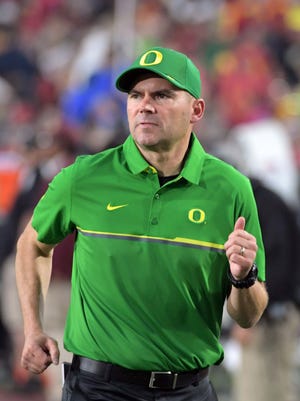Mark Helfrich's firing sends chilling message to coaching trade
Oregon’s loss to rival Oregon State in this year’s Civil War capped a fitting end to the program’s worst season in a generation, which has cast a spotlight on Mark Helfrich’s job security just two years after he led the Ducks to the doorstep of a national championship.

Helfrich met Oregon athletics director Rob Mullens to discuss his future Tuesday night and left the meeting without a job. Internal discussions about the football program began before Saturday’s loss, according to USA TODAY Sports. Since Saturday, Helfrich had been in coaching purgatory, with two feet straddling the line between retention and dismissal.
There is something far bigger than just Helfrich at play at Oregon, which in the past two decades has grown into one of college football’s elite programs. First as the offensive coordinator and then as head coach, Helfrich deserves recognition as a key figure behind the Ducks’ surge.
Oregon fires coach Mark Helfrich after four seasons
Firing Helfrich is a repudiation of perhaps the defining characteristic of Oregon’s run: the 40-season stretch of continuity that led from Rich Brooks to Mike Bellotti, from Bellotti to Chip Kelly and from Kelly to Helfrich.
And the school did it by repudiating his performance in its official announcement, closing the news release with a bizarre and completely unnecessary recounting of events that took shots at Oregon relying on graduate transfers in the post-Mariota era, revisiting a blown lead in the 2015 Alamo Bowl loss, specifically pointing out Helfrich's decisions to go for two points five times at Nebraska this season and using the term "one-sided" to describe three of the Ducks' losses this season.
Those passages were later removed by the author, who apologized on Twitter for including them.
Helfrich's firing also forces Oregon to embrace a pool of coaching candidates lacking in star power. There’s no reason to think Kelly would embrace a return to Oregon after just one season with the San Francisco 49ers. The program’s options are to entice a sitting Power Five coach — perhaps a Dan Mullen from Mississippi State or Jim McElwain from Florida — or dip into the Group of Five, whether Western Michigan’s P.J. Fleck or Boise State’s Bryan Harsin.
The case for or against Helfrich had already been litigated before Tuesday. Supporters point to a young team, a new defensive scheme, an unproven quarterback, a run of injuries and a one-year plummet in production. Detractors highlight the Ducks’ swoon since Marcus Mariota’s departure following the 2014 season. There is rationale for either argument.
There’s even some precedent: Auburn fired Gene Chizik just two seasons after he won the national title, following a precipitous drop from the top of the SEC to the bottom of the West Division. The following season, the Tigers reached the national championship game under his successor, Gus Malzahn.
But this is about more than just Helfrich, and the reach of Tuesday’s decision extends far beyond Oregon.
If you’re a college coach, take note: If Helfrich can be fired after one losing season, two seasons after the finest year in program history, after coaching the program’s only Heisman winner, with an eight-figure buyout — so can anyone else.
“It is the pathetic part of this business, without question,” Washington coach Chris Petersen said Monday. “It is the nature of the business, that’s what it is.
There are obvious exceptions: Nick Saban, Jim Harbaugh, Urban Meyer and Petersen himself, to name a few. But there are only so many coaches with that level of security; the rest are one losing season away from the hot seat, in a profession that grows more and more absurd and as demands for immediate and lasting success become more and more prevalent.
Coaching is a lucrative profession, but it’s also an absurd one, driven solely by one question: What have you done for me lately? Two years ago is irrelevant; today is what matters, and today Oregon is dealing with the fallout from its first losing season since 2004.
Army All-American CB Deommodore Lenoir decommits from Oregon
It’s not that Helfrich picked the wrong time for a step back, even if Washington’s simultaneous rise must shake the Ducks to their core. It’s that in college football, steps back are no longer allowed.
Today it’s Helfrich. Tomorrow it could be anyone else. It’s an idea that has come to pervade the entire profession: If we’re not winning big, winning titles and playing for championships every season, then we’ll find someone else who will. At its most basic level, this is an absolutely absurd notion.
Helfrich is merely the latest example. But he wouldn’t be the last coach to first lose his accumulation of goodwill and then his job for failing to match the unmatchable standard for success he helped to create.
COLLEGE FOOTBALL COACHING CAROUSEL
